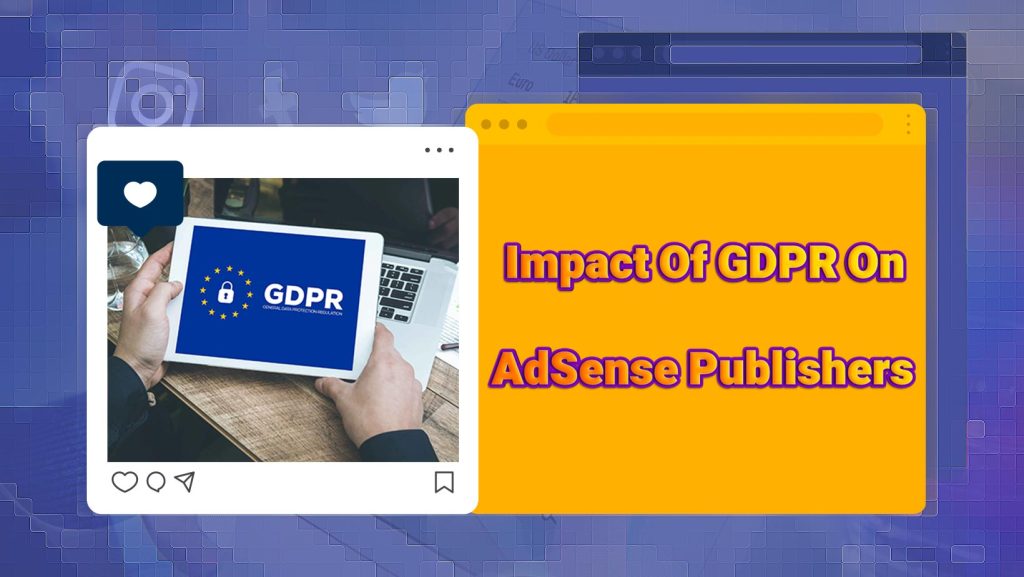Many website owners have expressed concern about the General Data Protection Regulation (GDPR), and for good reason.
This regulation, enforced by the European Union (EU), aims to give users more control over their data. But what does it all mean for you, the AdSense publisher?
This article explains GDPR’s impact on AdSense and how it affects publishers’ accounts.
In addition, we explain how GDPR affects ad serving and, most importantly, guide you through the steps to ensure your website is GDPR compliant. Google has implemented practical tools to help publishers navigate these regulations.
By the end of this article, you’ll clearly understand the GDPR, how it interacts with AdSense, and the practical steps you need to take to keep your website compliant and your revenue flowing.
We won’t let you wait any longer; let’s dive into the world of GDPR and AdSense!
What is Google GDPR Update?
To define it, Google’s GDPR update aims to ensure user privacy in its ad platform by requiring explicit consent and providing non-personalized ads.
Google’s approach to the GDPR is significant as a primary data collection and advertising player. Their decisions ripple through the businesses using their platform.
Google has taken steps to ensure user privacy and a functioning ad ecosystem, and it is facing hefty fines for non-compliance.
![]() This is how GDPR update works on AdSense:
This is how GDPR update works on AdSense:
1. Transparency & User Control
Google is developing solutions for the non-personalized ads shown to users who choose to share data.
These ads will be based on viewed content, not user history. This could impact AdSense revenue for publishers relying on personalized ads.
2. Direct vs. Indirect Consent
Google will obtain user consent directly for its services, such as Gmail and YouTube. However, websites and apps using Google’s ad platform must handle user consent.
This is to avoid interfering with existing publisher-user data relationships. Understanding AdSense and GDPR requirements is crucial.

3. Clear Communication & Records
Clear communications and records are critical for AdSense publishers to achieve GDPR compliance.
Publishers must obtain explicit user consent, maintain consent records, and provide opt-out options for users who change their minds.
Overall, Google’s GDPR update focuses on balancing user privacy with ad industry functionality. Publishers play a crucial role by obtaining explicit consent and managing user data responsibly.
We want to discuss how it affects the publishers and their accounts.
How Does GDPR Impact on Publishers’ AdSense Account?
The General Data Protection Regulation (GDPR) has brought significant changes to the online advertising landscape, and it does affect the publishers using AdSense. In the following part, you will get a breakdown of the impact and how to navigate it:
· The Impact of GDPR on AdSense Earnings
Personalized ads often generate higher revenue for publishers. Since GDPR requires user consent for data collection used in personalization, some publishers may experience a decline in income if users choose to keep their data private.
However, Google is developing “non-personalized” ads based on content, potentially mitigating some losses.
· How to Make AdSense GDPR Compliant?
- User Consent: As of January 2024, publishers in the EEA and UK need to use a Certified Consent Management Platform (CMP) to collect transparent user consent for personalized ads.
- Clear Communication: Your website needs a clear, easily accessible privacy policy explaining data collection practices and user rights.
- User Control: It empowers users with a simple method to turn off data collection and personalized advertising.

What Do AdSense Publishers Need to Do For GDPR?
AdSense publishers need to review Google’s resources. As you all know, Google offers resources and tools to help publishers understand and implement GDPR compliance. These resources detail best practices for GDPR compliance with AdSense.
Furthermore, you must ensure that your privacy policy reflects current data collection practices and user rights under GDPR.
Finally, if you serve ads to users in the EEA or UK, use a Google-certified CMP to collect user consent for personalized ads.
By following these steps, you can confirm that your AdSense account operates within GDPR. A GDPR-compliant website fosters user trust, which can benefit your website and brand reputation in the long run.
In the following section, we have prepared a GDPR compliance checklist for AdSense publishers.
GDPR Compliance Checklist for AdSense Publishers
- Please familiarize yourself with the core principles of GDPR and how it applies to your website and AdSense usage.
- Review Google’s GDPR guidance for AdSense publishers.
- If your website serves ads to users in the EEA or UK, implement a Certified Consent Management Platform (CMP).
- Craft a clear and accessible privacy policy that outlines data collection practices, usage, and user rights under GDPR.
- Provide a user-friendly opt-out mechanism for data collection and ad personalization.
- Maintain records of user consent choices, including date, time, and opt-out actions.
- Be prepared to respond to user data requests within the GDPR timeframe (typically one month).
- Regularly review your website’s GDPR compliance and update practices as needed.
- (Optional) Consider consulting a data privacy professional for complex websites if you need clarification on compliance.
This might be helpful in your AdSense journey and learning how to comply with your website with GDPR. I hope it is functional.
To Reiterate
We all know that the GDPR has undoubtedly introduced some complexities for AdSense publishers.
However, by understanding the regulations and taking proactive steps, which we have added to that article, you can ensure your website remains compliant and fosters trust with your users.
![]() Here’s a quick recap:
Here’s a quick recap:
- User consent is paramount.
- Transparency in data collection and usage is critical.
- Providing clear opt-out options for your users.
Now, it is your turn to ask yourself: Have you implemented any GDPR compliance measures for your AdSense account? Please write down your experiences and any questions in the comments below.
We are waiting to hear from you.


